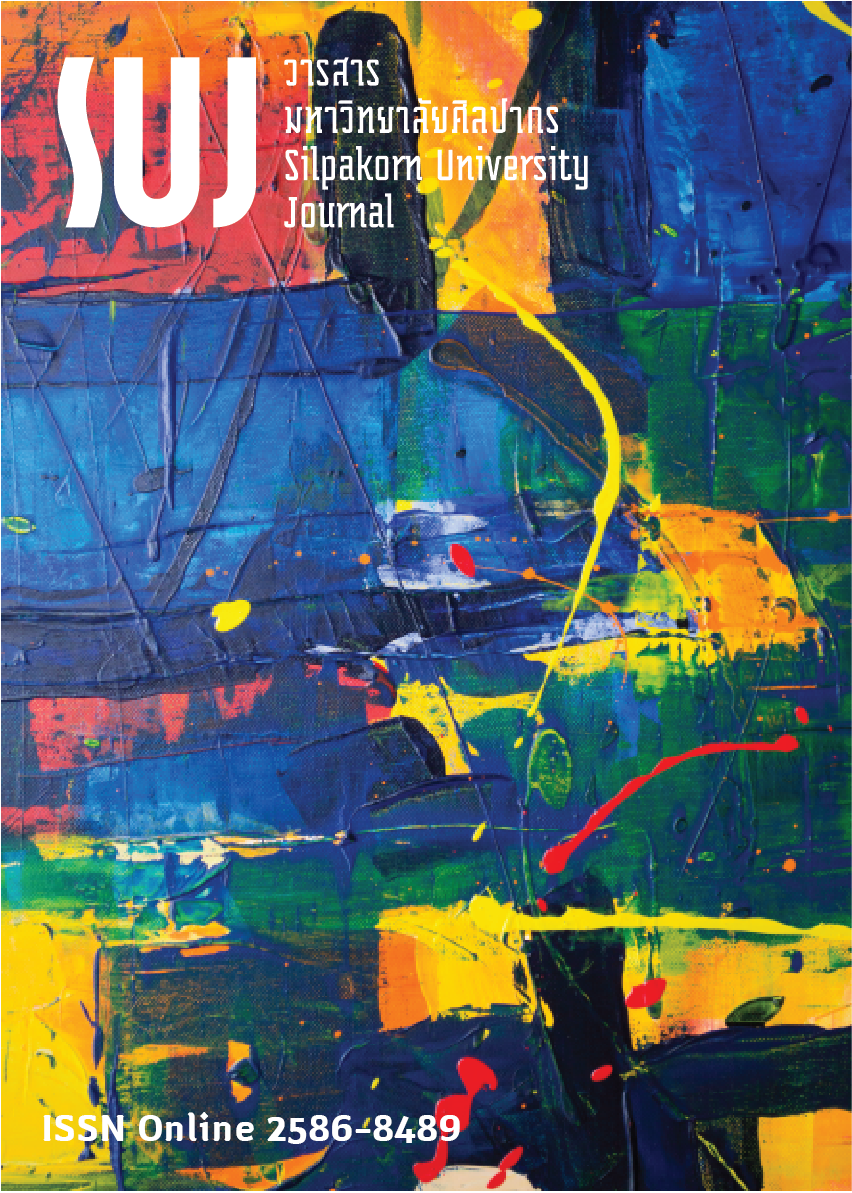ภูมิปัญญาการดูแลสุขภาพสตรีหลังคลอดของชาวไทยทรงดำ ตำบลหนองปรง อำเภอเขาย้อย จังหวัดเพชรบุรี (Local wisdom of Thai Song Dam women’s postpartum healthcare at Nong Prong Sub-District, Khao Yoi District, Phetchaburi Province)
Main Article Content
Abstract
ชาวไทยทรงดำ ตำบลหนองปรง อำเภอเขาย้อย จังหวัดเพชรบุรี เป็นกลุ่มชนที่เก่าแก่และมีวัฒนธรรมความเชื่อดั้งเดิมเกี่ยวกับการดูแลสุขภาพสำหรับสตรีหลังคลอด การวิจัยครั้งนี้เป็นการวิจัยเชิงคุณภาพ มีวัตถุประสงค์เพื่อศึกษาความเชื่อ ทัศนคติ และพฤติกรรมในการดูแลสุขภาพสตรีหลังคลอดด้วยภูมิปัญญาพื้นบ้านของชาวไทยทรงดำ ตำบลหนองปรง อำเภอเขาย้อย จังหวัดเพชรบุรี โดยมีผู้ให้ข้อมูลสำคัญ 7 คนจากการสุ่มแบบเฉพาะเจาะจง ได้แก่ หมอพื้นบ้านและสตรีหลังคลอด เครื่องมือที่ใช้ในการวิจัย ได้แก่ แบบสัมภาษณ์แบบเจาะลึกร่วมกับการวิเคราะห์เนื้อหาจากข้อมูลปฐมภูมิและข้อมูลทุติยภูมิ รวมถึงการวิเคราะห์ข้อมูลเชิงปริมาณโดยใช้ค่าร้อยละและค่าเฉลี่ย ผลการวิจัยพบว่าสตรีหลังคลอดทุกคนมีความเชื่อว่าการทับหม้อเกลือสามารถช่วยให้มดลูกหดรัดตัวเข้าอู่ การนวดเต้านมช่วยบรรเทาอาการเจ็บของเต้านมและช่วยให้น้ำนมไหลได้ดี การอาบน้ำต้มสมุนไพรช่วยดับกลิ่นคาว แก้อาการอักเสบและเพิ่มการไหลเวียนเลือด การอยู่ไฟในระยะหลังคลอดช่วยให้มดลูกเข้าอู่เร็วและช่วยขับน้ำคาวปลาซึ่งเป็นเลือดเสียออกและป้องกันโรคภัย ทุกคนมีทัศนคติที่ดีต่อการดูแลสุขภาพตนเองตามภูมิปัญญาพื้นบ้านตามวิธีการดูแลสุขภาพของสตรีหลังคลอดของชาวไทยทรงดำ ได้แก่ การดื่มน้ำสมุนไพร การรับประทานอาหารที่มีประโยชน์ การงดอาหารแสลง การนวดเต้านม การอาบน้ำสมุนไพร การทับหม้อเกลือ และการอยู่ไฟ ซึ่งเป็นไปตามทฤษฎีการดูแลสตรีหลังคลอดด้วยศาสตร์การแพทย์แผนไทย ส่วนหมอพื้นบ้านมีวิธีการดูแลสตรีหลังคลอด คือ การอยู่ไฟ การอาบน้ำสมุนไพร การจ่ายยาสมุนไพรสำหรับรับประทาน การนั่งถ่าน การประคบด้วยขมิ้น และการใช้มุ้งสีดำสำหรับคู่แต่งงาน
Thai Song Dam in Nong Prong sub-district, Khao Yoi district, Phetchaburi province is an old tribe that has its wisdom of postpartum care. This qualitative research aimed to study the basis, attitudes, means of postpartum healthcare based on the folk wisdom of Thai Song Dam in Nong Prong sub-district, Khao Yoi district, Phetchaburi province. The seven key informants consisting of folk doctors and postpartum women were specifically sampled and interviewed using in-depth questionnaires. The quantitative data were analyzed using percentages and mean. The results revealed that all postpartum women believed that hot salt pot compression can increase the contraction of the uterus. Breast massage can also relieve breast pain and increase the ability of breastfeeding. Hot herbal baths cannot only help discharge of lochia abnormality and the inflammation of perineum but also increase blood circulation. Postpartum care during a postnatal period was believed to improve the health of a mother by increasing the involution of the uterus and preventing uterine bleeding. All postpartum women have a positive attitude towards maternal care according to Thai Song Dam’s folk wisdom, including taking herbal drinks, avoiding unhealthy food, having breast massages, taking hot herbal baths and undergoing hot salt pot compression according to Thai traditional medicine. On the other hand, folk physicians will give some herbal medicine, heal a perineum wound with hot herbal steam bathing (Nung Than), apply therapeutic turmeric compression, and use black nets for married couples.
Downloads
Article Details
References
Khamnuansil, Sunee., Siriwong, Pihak. & Thapthong, Pichittapa. (2004). Encyclopedia of Thai Dam (สารานุกรมไทยดำล้ำค่า). Phetchaburi: Phetphumkarnpim.
Kulprasutidilok, Akua. & Phollawan, Punyapha. (2018). Knowledge for Healthcare from the Local Wisdom of Thai Song Dum Community in Bandon, Uthong District, Suphanburi Province (องค์ความรู้ด้านการดูแลสุขภาพจากภูมิปัญญาท้องถิ่นของชุมชนไทยทรงดำ ตำบลบ้านดอน อำเภออู่ทอง จังหวัดสุพรรณบุรี). Journal of Community Development and Life Quality, 6(1): 106-130.
Lumpech, Thongchai. (2011). Thai Song Dum People’s Way of Life Bandon Sub-district, U-Thong District, Suphanburi Province (วิถีชีวิตชาวไทยทรงดำ ตำบลบ้านดอน อำเภออู่ทอง จังหวัดสุพรรณบุรี). Khon Kaen: Khon Kaen University.
Sae Lim, Jutamart., Tanthai, Kitti., Khantiworaphong, Sodsai. & Anantasaram, Jakkrit. (2013). The Co-application of Thai Medical Practices and Medical Sciences in Pregnancy Cares: A Case Study of Moo Baan Thato, Amphur Sadoa, Songkhla Province (การใช้การแพทย์แผนไทยร่วมกับการแพทย์แผนปัจจุบันในการดูแลครรภ์ กรณีศึกษา หมู่บ้านท่าโต้ อำเภอสะเดา จังหวัดสงขลา). The 4th Hat Yai Academic Conference: 22-30.
Saocharoen, Pennapa. (2002). Thai traditional medicine for medical students (การแพทย์แผนไทยสำหรับนักศึกษาแพทย์). Nonthaburi: Institute of Thai Traditional Medicine.
Somanusorn, Maneeporn. (2001). Obstetrics Nursing 2nd edition (การพยาบาลสูติศาสตร์ เล่ม 2). Nonthaburi: Project Academic Welfare, Praboromarajonok Institute.
Thongsong, Weerisa. (2016). The Role and Traditional Knowledge of Traditional Birth Attendants in Phatthalung Province (บทบาทและภูมิปัญญาพื้นบ้านของหมอตำแยในจังหวัดพัทลุง). Songkhla: Prince of Songkla University.


